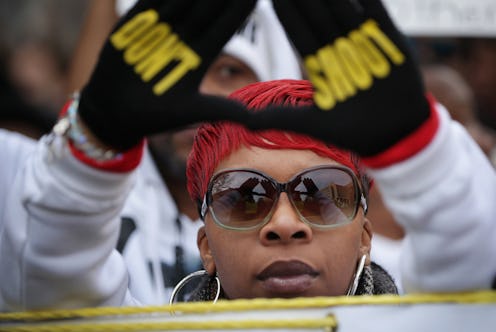News
NY Governor Silent On Criminal Justice Reform
In his State of the State address Wednesday, New York Gov. Andrew Cuomo ducked a serious discussion about criminal justice reform and instead outlined an expansive plan of new spending proposals, including investments in infrastructure and loan forgiveness for recent college graduates. Notably absent was any mention of the “soup-to-nuts” review of the state’s criminal justice system that the governor promised after a Staten Island grand jury failed to indict a white officer for the chokehold death of Eric Garner, a 43-year-old African American, back in December.
In recent weeks, rumors had circulated that Cuomo had considered a number of significant reforms to the grand jury process, including increased disclosure of the evidence presented in the proceedings and the institution of an automatic state-level review of any cases of police-inflicted brutality that failed to win a grand jury’s indictment. Most controversially, the governor’s office looked into mandating that police brutality cases go to a special prosecutor rather than the local district attorney in order to avoid concerns over the tight-knit relationships between many prosecutors and their police departments.
New York state’s attorney general, Eric Schniederman, made headlines back on Dec. 8 by asking Cuomo to use an executive order to place all cases involving police brutality beneath his jurisdiction on the state level. He wrote in a letter to the governor:
A common thread in many of these cases is the belief of the victim’s family and others that the investigation of the death, and the decision whether to prosecute, have been improperly and unfairly influenced by the close working relationship between the county District attorney and the police officers he or she works with and depends on every day.
Although open to some reform of the grand jury process, the state’s District Attorney Association was “diametrically opposed” to the idea of using special prosecutors to supersede the authority of local DAs, according to association president and Erie County DA Frank Sedita. In a memo to Cuomo that was obtained by The New York Daily News, Sedita added that the prosecutors would be OK with a proposal that only allowed a special prosecutor at the local DA’s request.
Kenneth Thompson, Brooklyn’s newly elected DA, expressed dismay that Schneiderman and Cuomo might rob the district attorneys of their authority to charge and prosecute cases of police violence:
As the duly elected district attorney of Brooklyn, I am more than able to thoroughly and fairly investigate any fatality of an unarmed civilian by a police officer.
In turn, Cuomo appears to have bowed before the trenchant opposition from the local prosecutors; his State of the State speech kept the issue of criminal justice reform at arm’s length. As TWC News reporter Nick Reisman tweeted, Cuomo’s briefing book had only the following to say on the criminal justice reform that he had promised earlier:
Following the failure of the Staten Island and the Missouri grand juries to indict cops for the deaths of unarmed black men in the past three months, debates have raged over whether local prosecutors are the appropriate authorities to investigate instances of police brutality and bring charges. After all, prosecutors and the police forces work hand-in-hand on the bulk of their cases, a position that often encourages close relationships between attorneys and cops.
Black Lives Matter, the protest movement sparked by the unaccountable killings of unarmed black men, women, and children by police, has pushed for the introduction of special prosecutors; the local district attorneys and the police have been vehemently opposed.
But as Jeremy Toobin notes at The New Yorker, there is no way to guarantee that an attorney — whether the locally elected prosecutor or a special appointee flown in from the state government — will treat a case impartially. Human beings are fallible, and one local DA might do a better job at investigating police killings than a special prosecutor, and another might do much, much worse.
That said, the close relationship between local district attorneys and police departments is hard to overlook. A special prosecutor might not be warranted in all cases. But without some sort of systematic review of police brutality investigations and indictments, the public won’t be able to trust that justice was served, even if, for all intents and purposes, it was.
As Schneiderman noted in his letter to Cuomo:
All too often, the families of the victims and the members of their communities are left with the belief that our criminal justice system has both unjustly targeted and inexplicably failed them.
Images: Getty Images (2)
